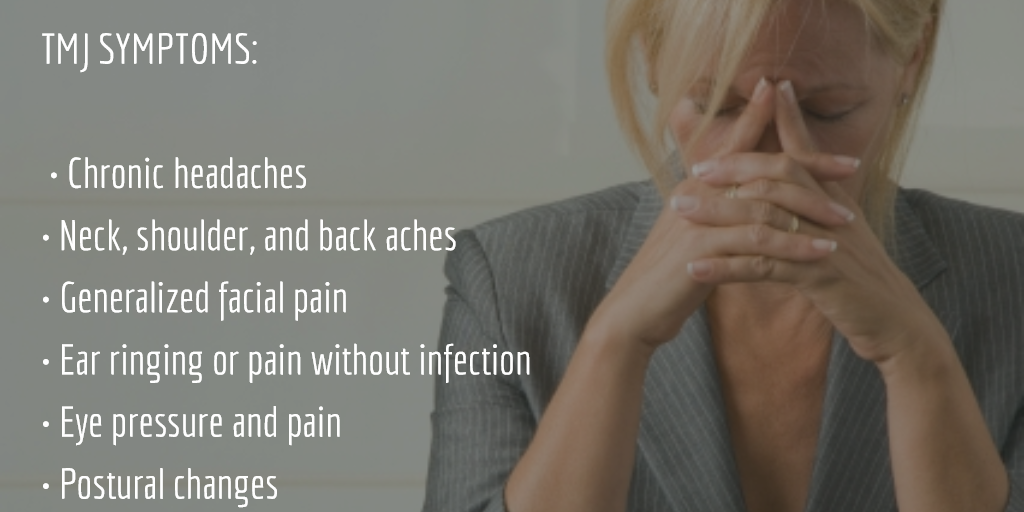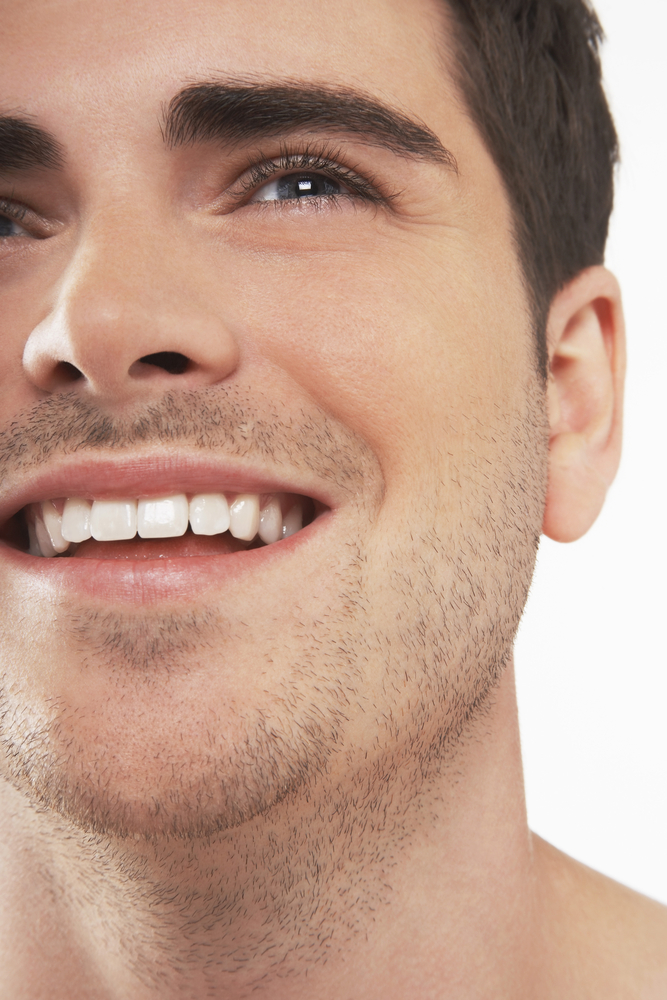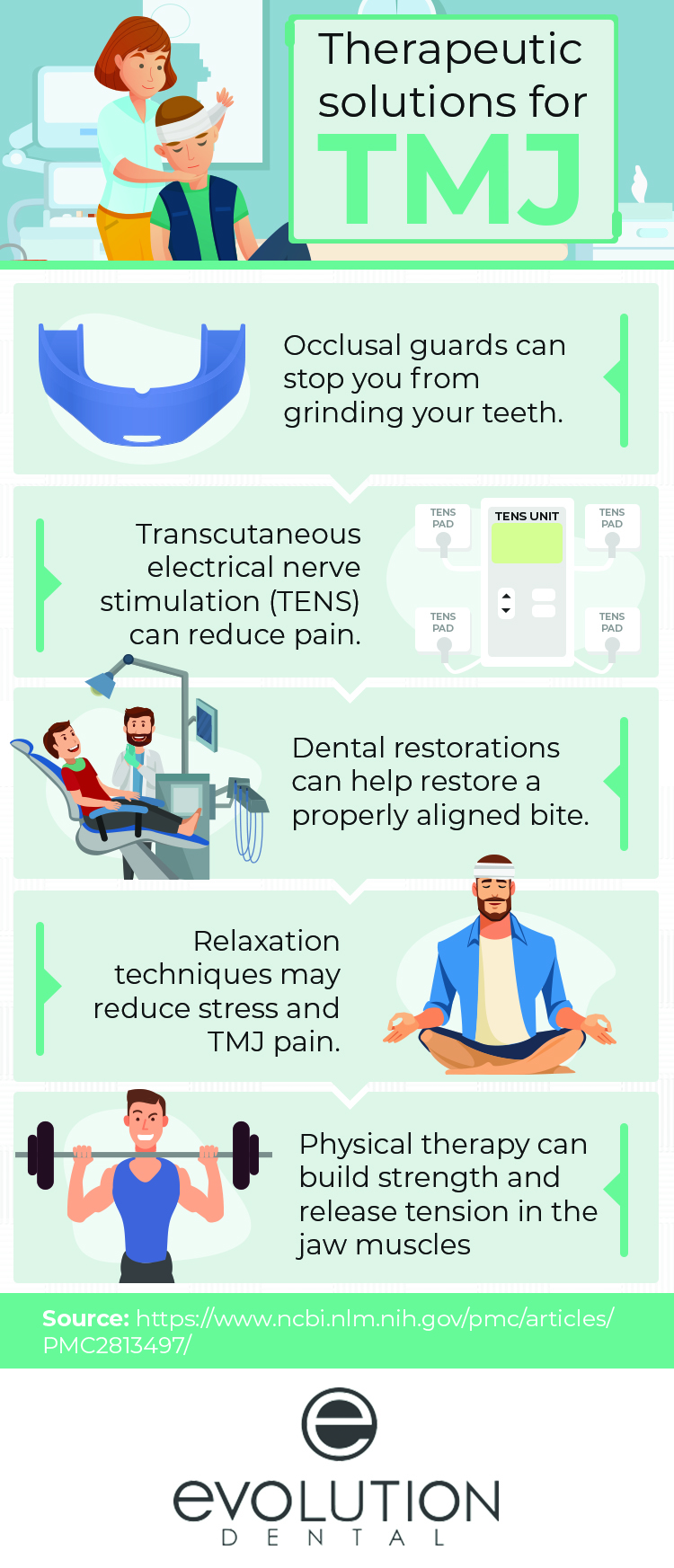When you consider your oral health, you most likely think primarily about the health, function and appearance of your teeth. However, optimal oral health also involves the correct alignment of your jaw joints, known as temporomandibular joints. These joints are responsible for all of your jaw’s movement and even slight misalignment can cause symptoms such as popping, clicking or grinding sounds when you open or shut your mouth.
If you are experiencing discomfort or noises in the jaw when chewing or biting, please contact Evolution Dental today online or at 403-407-5730 to schedule an appointment with Dr. Kendra Schick. We proudly welcome patients from Calgary, Cochrane and neighboring communities of Alberta.
On this page, we have provided information on a number of important TMJ-related topics, including:
- What is TMJ disorder?
- TMJ symptoms
- TMJ headaches
- TMJ and ear pain
- What are common TMJ causes?
- TMJ and bruxism
- TMJ treatment and pain relief
- Why treat TMJ dysfunction?
- Contact Evolution Dental today to discuss TMJ
What Is TMJ Disorder?
 The temporomandibular joint is one of the most complex joints in your body, connecting your lower jaw to your skull. It’s one of the few joints in the body that moves both up and down and side to side. It is connected to many of the muscles and nerves in your facial region. This high level of complexity helps your jaw perform important daily functions such as talking, chewing and yawning.
The temporomandibular joint is one of the most complex joints in your body, connecting your lower jaw to your skull. It’s one of the few joints in the body that moves both up and down and side to side. It is connected to many of the muscles and nerves in your facial region. This high level of complexity helps your jaw perform important daily functions such as talking, chewing and yawning.
Temporomandibular joint disorder (TMJ) is the name given to the condition that results from a misalignment of the jaw. It can cause chronic pain in a number of areas throughout your body, making it often difficult to diagnose. Dr. Schick has years of experience in the proper diagnosis and treatment of TMJ and continues to train on the subject every year.
The best way to determine if your symptoms are a sign of TMJ syndrome is to schedule an evaluation with Dr. Schick. She will conduct a thorough evaluation and recommend an appropriate treatment when necessary.
TMJ Symptoms
The severity of TMJ and its associated symptoms can range from mild to debilitating. Some of these symptoms can include:
- Jaw problems: These can include popping, clicking or grinding sounds, as well as lockjaw or stiffness.
- Head conditions: These can include dizziness and migraine-like headaches.
- Facial symptoms: These can include swelling, pain and muscle fatigue.
- Ear issues: These can include difficulty hearing, ringing (tinnitus) and pain.
- Body aches: These can include pain in the neck and shoulders.
Some of these symptoms may be present even if you don’t have TMJ. It’s important to find out if TMJ is the source of your pain. Dr. Schick can assess your oral condition and design a treatment plan that is right for you.

TMJ Headaches
TMJ is a disorder of the jaw, but it can cause far-reaching problems, including headaches. TMJ may cause different kinds of headaches:
- Tension headaches: These are the most common types of headaches associated with TMJ. They result from muscle tension and feel like an aching, dull pain that constricts your skull. These headaches are caused by TMJ because of jaw muscle tension that travels from the bottom of the jaw to the area of the skull behind the eyes.
- Referred pain headaches: This type of headache is just severe jaw pain that feels like a headache. This misleading pain is more common than you might think and contributes to the difficulty of tracking down the source of TMJ pain.
- Migraine-like headaches: The link between migraines and TMJ is complicated. While research continues on the true nature of migraines, it seems they can be triggered by overstimulation of the trigeminal nerve. This nerve is also entwined with jaw muscles, and overactive muscles of the jaw may put pressure on these nerves, causing migraine-like headaches.
Not all headaches or facial pains are the result of TMJ syndrome. However, this common condition can be overlooked when diagnosing chronic pain. If you suffer from frequent and intense facial pain or headaches, Dr. Schick can help identify the cause of your discomfort and recommend a customized treatment plan to help you find lasting health and comfort.
TMJ and Ear Pain
Patients who struggle with temporomandibular joint dysfunction often report ear pain along with other common symptoms. TMJ related ear pain may feel like:
- Feeling of fullness in the ear
- Sharp pain behind, below, inside or around the area of the ear
- Dull, aching pain
- Ear infection
- Pain when speaking, chewing or swallowing
- Ringing or other noises
It’s important to understand that many other issues can result in ear pain. Other causes can be infection of the ear, throat or tooth, ear wax and other facial pain conditions such as trigeminal neuralgia. Meeting with Dr. Schick can help to determine the true cause of your discomfort.
What Are Common TMJ Causes?
 The temporomandibular joints help connect your lower jaw (mandible) to your skull. They are components of a sensitive connective network that also includes the trigeminal nerve. This nerve is responsible for registering sensation throughout your face.
The temporomandibular joints help connect your lower jaw (mandible) to your skull. They are components of a sensitive connective network that also includes the trigeminal nerve. This nerve is responsible for registering sensation throughout your face.
A number of issues can overstress the nerves, muscles and joints in the connective region between your lower jaw and skull, including:
- A misaligned jaw
- Arthritis
- A severe blow to the jaw
- Grinding your teeth (bruxism)
- Dislocation of the disk between your jawbone and jaw socket
As these issues persist or go untreated, it can lead to recurring and progressively worsening symptoms. It’s important to meet with Dr. Schick and determine a treatment plan that is right for your condition.
TMJ and Bruxism
Temporomandibular joint dysfunction can be related to the unconscious grinding of teeth, or bruxism. This often occurs while you sleep.
Bruxism can sometimes be caused by TMJ. Other times, it’s the other way around; persistent tooth grinding can place excessive stress on the jaw joints and lead to TMJ disorder. When you grind your teeth, important enamel wears down, making your teeth more susceptible to decay and sensitivity.
TMJ Treatment and Pain Relief
 The goal of TMJ treatment is to keep your jaw aligned and your muscles free from pain. Dr. Schick can help relieve TMJ discomfort by easing pain, identifying the ideal position of your jaw and correcting a misaligned bite.
The goal of TMJ treatment is to keep your jaw aligned and your muscles free from pain. Dr. Schick can help relieve TMJ discomfort by easing pain, identifying the ideal position of your jaw and correcting a misaligned bite.
At Evolution Dental, every treatment is customized to address your unique situation. Depending on your individual needs, Dr. Schick may use treatments such as:
- Transcutaneous Electro Neural Stimulation (TENS): This therapy is designed to treat TMJ pain by sending small electrical pulses to your jaw and facial muscles. These mild currents help to relax the muscles so that Dr. Schick can determine an appropriate position for your jaw.
- TMJ splint: These plastic orthotic devices can serve a number of uses. Stabilizing splints such as night-guards are worn to prevent you from clenching or grinding your teeth during sleep. Repositioning splints attempt to pull the lower jaw forward for bite repositioning. Splints allow muscles and ligaments to relax, reducing the tension, tightness and other jaw problems associated with bruxism (teeth grinding).
- Orthodontics: Depending on a number of factors, Dr. Schick may recommend a long-term solution such as Invisalign or traditional braces to correct your bite.
There are certain things you can do at home to help ease the discomfort caused by TMJ, or to possibly prevent it from developing, such as:
- Practice good posture; keep your back straight, shoulders squared and head up.
- Don’t sit with your chin resting on your hand.
- Chew your food evenly, using both sides of your mouth.
- Avoid constant gum chewing.
- Avoid teeth grinding.
- Relax your face; follow the rule, “Lips together, teeth apart.”
Dr. Schick will discuss these and all of your options with you during your TMJ appointment.
Why Treat TMJ Dysfunction?
 TMJ cases can be quite painful, but some people with the disorder may only experience mild annoyance. Many times, if a patient is not in considerable pain, he or she will not seek immediate treatment from a dentist. It is crucial to understand that TMJ is a progressive condition, and will continue to worsen over time. Even if you are not currently struggling with constant pain, it is likely that you will in the future.
TMJ cases can be quite painful, but some people with the disorder may only experience mild annoyance. Many times, if a patient is not in considerable pain, he or she will not seek immediate treatment from a dentist. It is crucial to understand that TMJ is a progressive condition, and will continue to worsen over time. Even if you are not currently struggling with constant pain, it is likely that you will in the future.
In addition to your facial region, any problem with your temporomandibular joint can also impact your posture and body positioning. Your head and neck will naturally adjust their positions when trying to compensate for a sloping jaw. This can lead to hunching, shrugged shoulders or other postural abnormalities.
Other systemic issues related to TMJ include:
- Diminished lung capacity
- Decreased organ oxygenation
- Spinal or back pain
- Digestive dysfunction
- Irregular blood pressure
Issues related to inadequate oxygenation can impact your mood and temperament and negatively affect your cognitive abilities. Dr. Schick will examine your jaw joint during your examination and inform you if treatment may be necessary.
Contact Evolution Dental Today to Discuss TMJ
If you live in the Calgary or Cochrane communities of Alberta and suffer from chronic headaches, ear pain or other possibly TMJ-related discomfort, please don’t wait another day to seek treatment with our experienced dentist Dr. Kendra Schick. Call Evolution Dental now at 403-407-5730 to schedule an appointment.
